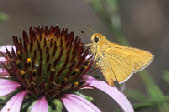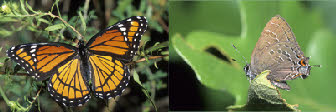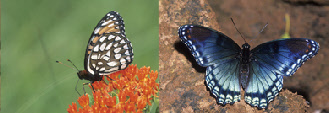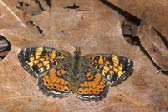The Butterflies of the World Foundation
A Non-






Oarisma garita, captured by jumping spider, Killdeer Mountains Wildlife Management
Area, Dunn County, North Dakota, 27 June 2003 Ref
#: SP-
Garita Skipperling
Oarisma garita, Reakirt, 1866
Subfamily Hesperiinae
Tribe Thymelicini
Taxonomy
The family Hesperiidae includes all butterflies that are collectively called skippers because of their fast skipping flight. This family is the sole member of the Superfamily Hesperioidea. Whereas, the other five families of butterflies belong to the Superfamily Papilionoidea. So, skippers are considered butterflies, but they have a few traits different than the species of “True” butterflies found in the Superfamily Papilionoidea. Some of these traits include large eyes, short antennae (often with hooked clubs) and stout bodies. Most also have a very rapid flight with a fast, almost blurred, wing beat. There are about 3,500 species of skippers and they’re further divided into seven subfamilies. They occur worldwide with more found in the tropics. Most species are brown or tan, but some tropical members can be quite colorful.
All photographs, artwork, text and website design are the property of The Butterflies of the World Foundation (unless otherwise stated) and are protected under national and international copyright laws. Photographs, artwork or text on this website may not be reproduced in any way without prior written consent of The Butterflies of the World Foundation.
Oarisma garita, near Cherry Creek, Little Missouri National Grassland, McKenzie County,
North Dakota, 11 June 2005 Ref
#: I-

Oarisma garita, Blue Buttes, Little Missouri National Grassland, McKenzie County,
North Dakota, 20 June 2002 Ref
#: I-

Oarisma garita, Blue Buttes, Little Missouri National Grassland, McKenzie County,
North Dakota, 20 June 2002 Ref
#: I-

Oarisma garita, Square Butte, Little Missouri National Grassland, Golden Valley County,
North Dakota, 3 July 2004 Ref
#: I-

Oarisma garita, Little Missouri State Park, Dunn County, North Dakota, 21 June 2002
Ref
#: I-

Oarisma garita, Square Butte, Little Missouri National Grassland, Golden Valley County,
North Dakota, 12 June 2004 Ref
#: I-

Oarisma garita, Little Missouri State Park, Dunn County, North Dakota, 13 June 2003
Ref
#: I-

Oarisma garita, Little Missouri State Park, Dunn County, North Dakota, 13 June 2003
Ref
#: I-

Oarisma garita, Little Missouri State Park, Dunn County, North Dakota, 13 June 2003
Ref
#: I-
General Information:
Oarisma garita belongs to the subfamily Hesperiinae. This species is found from
the high plains in central Alberta east to southern Manitoba then south through the
Rocky Mountain region to northern Mexico. Its preferred habitat includes short-
Lifecycle:
The larval food source includes various grasses such as bluegrass, Poa pratensis, and blue grama, Bouteloua gracilis. To find receptive females, males patrol all day in grassy areas. Females lay eggs singly on grass stems or blades. Fourth instar caterpillars hibernate.